
Collect with small Zero Waste Bags
Recycle all PPE (masks and gloves)* by using our small Zero Waste Bag. Make sure to check off the “PPE” checkbox on the front of the bag. When the Zero Waste Bag is full, seal it, then scan the QR code or log in to your account to schedule a pickup. Place the bag in your collection bin or at your doorstep, and we’ll pick it up at the scheduled time.
*We do not accept medical waste of any kind.
Buy small Zero Waste BagsHow we recycle

When we receive your Zero Waste Bag, we check it in and sort out anything that isn't accepted waste.

All materials are size-reduced through shredding. Metals are smelted and plastics are cleaned, sorted, and blended with other plastics as necessary.

After processing, the raw materials are used to make new products, including items that will benefit your local community.
Learn more about how we recycle personal protective equipment ⬇
Each Zero Waste Bag is opened upon receipt and visually inspected for any non-compliant materials, then consolidated for processing in bulk.
The consolidated materials are then manually sorted into categories based on predominant material makeup and secondary stage mechanical processing requirements.
All materials are size-reduced through shredding. Metals are removed through magnetized and electrostatic sortation. Sorted metals are then smelted and formed for use in secondary metals manufacturing. The remaining plastic materials are then sorted by density profile and composition through multi-stage air, optical, and water-based mechanical sortation systems. Clean, sorted plastics are mixed with other plastics to make recycled plastic blends that are then used by various manufacturers to make new products.
